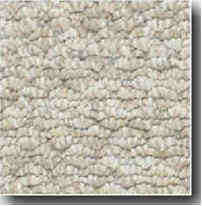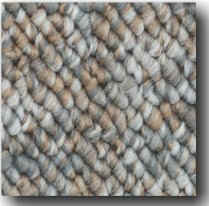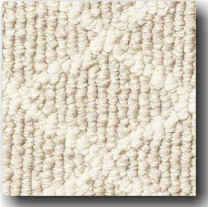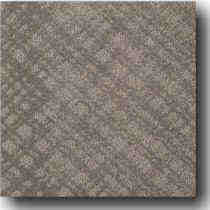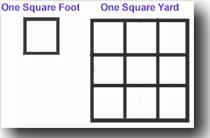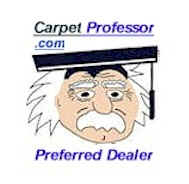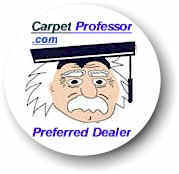How To Choose New Flooring Like A Pro!
Carpet | Vinyl & Tile | Recommended Stores
(Free Information by Consumer Advocate - No Flooring Sales)
Berber Carpet
Types, Styles, Cost, Pros & Cons
History - Berber Tribal Area Rugs
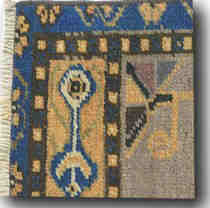 Berber
Area Rugs have been around for a long time, originally made by the Berber
tribe of Northern Africa.
Berber
Area Rugs have been around for a long time, originally made by the Berber
tribe of Northern Africa.
Many of these beautiful area rugs are still hand-made in parts of Africa, but they do not resemble the Berber styles you will find at your local carpet retailer today.
What Is Berber Carpet?
Here are some important facts and useful information to help you choose the right Berber Carpet Style for your home.
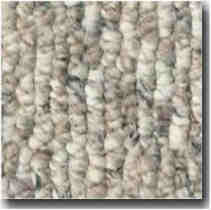 Berber
is a style of wall-to-wall carpet with a configuration of looped and/or cut-pile
fibers to create an elegant and unique appearance.
Berber
is a style of wall-to-wall carpet with a configuration of looped and/or cut-pile
fibers to create an elegant and unique appearance.
Some styles are made with just loops while others have a pattern using loops and cut pile tufts. There are hundreds of different styles and patterns to choose from.
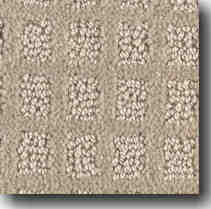 Some
styles just have random rows of loops like the Looped Style shown above.
If it uses cut pile and loops randomly, it is called a Cut and Loop.
Some
styles just have random rows of loops like the Looped Style shown above.
If it uses cut pile and loops randomly, it is called a Cut and Loop.
If it has a repeating pattern it would be called a Patterned Cut and Loop as shown in this image.
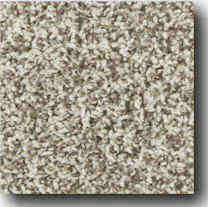 Another
popular style is called a
“Cut Berber”
and has no loops at all. (Hence the word “cut”) This style is also known as
a California Berber. These styles look very similar to a Frieze style.
Another
popular style is called a
“Cut Berber”
and has no loops at all. (Hence the word “cut”) This style is also known as
a California Berber. These styles look very similar to a Frieze style.
California Berbers often have a speckled-egg look with light earth tones infused with flecks of bright colors like red, orange, blues and greens though-out. These are very beautiful and there is usually no repeating pattern with this style.
Should I Buy a Berber Carpet?
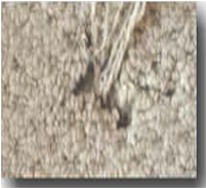 If
you have active kids and pets, a looped Berber may not be a wise choice.
If
you have active kids and pets, a looped Berber may not be a wise choice.
Any carpet made with loops can be snagged. This is especially true with residential Berber styles. Once a loop is snagged it can easily be pulled out further which will make the damage even worse. Never pull on a snag!
Snags can be caused by any number of reasons but the most common cause of snags is from kids and pets. Toys often snag and pull a loop loose and a dog's nails can easily snag a loop.
Berber Carpet Repair
Fixing snags and other types of carpet damage can be difficult and costly. I found a website of a company that specializes in repairing Berber carpets. They have videos to watch and offer free advice and instruction if you want to try to Repair-the-Snag yourself. Visit Creative Carpet Repair to lean more.
Berber Carpet On Stairs
Inexpensive looped Berbers made from Olefin don't hold up well on stairs. The loops mat down quickly along the leading edge of each step and Olefin is hard to keep clean.
If you really want a looped Berber on your stairs, go with a nylon style and make sure the loops are small and tightly packed together. At least 8-pound padding for stairs is essential.
Make sure the direction of the nap flows down the stairs. Every installer should know this, but once in a while I hear a homeowner complain about the nap going the wrong way.
Berber Carpet Care and Cleaning
Read your new carpet warranty for the best information regarding proper care and maintenance of your carpet. Be sure to follow all carpet cleaning requirements to the letter and save all your carpet cleaning receipts as proof of service.
5 Popular Berber Styles
|
|
1. Simple Loop
2. Multi-Color Loop
3. Patterned Loop
|
|
4.Cut and Loop
5. Cut Pile Berber
(no loops aka California Berber)
If the style has a repeating pattern then it is called a “Patterned Cut and Loop”. These are typically more costly but are quite beautiful and have an elegant appearance.
If you choose a Berber with a repeating pattern, and your rooms are wider than 12 feet, then you need to make sure to order enough extra carpet to allow for seaming and aligning the pattern match properly. Some styles are available in 13' 5" widths to help reduce the need for seams.
An experienced carpet salesperson or estimator will know how much extra carpet is needed based on your room size and carpet selection.
How Much Does Berber Cost?
Nylon Berber Styles range from $35 to $60+ per square yard, depending on the type of Nylon and the carpet style. Berbers made from Olefin range from $15 to $30 per square yard. You can save money if you learn the secrets about how to choose Carpet Remnants
Berbers made from Wool can easily cost $100 per square yard and go up from there. Learn more about Carpet Cost and Prices
Berber Fiber Choices
When it comes to selecting the right Carpet Fiber for you there are two main things you should consider: Cost and Longevity.
Olefin is the least costly, not very resilient and it wears out the fastest.
Polyester or PET is very soft, colorfast and resists stains. It is not very resilient and is prone to matting.
Nylon is great for heavy traffic areas because it is super resilient and abrasion resistant.
Wool is the most elegant but also the most costly.
Berbers Made From Olefin
Olefin (also called Polypropylene or EurolonTM) is the least costly fiber to consider.
Olefin is very strong and very durable but is not a soft fiber. It is prone to matting and crushing because it is not very resilient.
Berber styles with large loops mat down quickly so it is best to choose a style with smaller loops to reduce the chance of matting.
Olefin tends to attract dirt. During the manufacturing process the Olefin fiber becomes oily and while they try to remove as much of the oil through a multiple rinsing process, it is difficult to remove it completely.
The residual oil left on the fiber strand tends to attract dirt and makes the carpet difficult to keep clean. Homeowners often complain saying old spots and stains tend to magically reappear a few days after a professional steam cleaning.
Berbers made with Olefin are very reasonably priced but generally only last up to 10 years if well cared for and in low to medium foot-traffic applications. Cost for a simple Berber made from Olefin starts at $15 and goes up to $30+ for patterned cut and loop styles.
Berbers Made From Polyester
Berber made from the Polyester fiber are best used in low to medium foot-traffic applications. This is because polyester is not very resilient and is prone to matting and crushing of the pile.
It is often difficult to identify which fiber a carpet is made from. They market fibers under many different trade names like Everstrand, PureColor, Cleartouch, Ecolor, PET, Sorona and many others.
Here is how they may describe their fiber without ever mentioning what fiber it is:
"Our proprietary fiber is constructed using heat-set super-fine synthetic yarns. These fibers are anti-static and anti-microbial, It’s also a solution-dyed fiber and is considered non-toxic."
Nylon Berbers
Nylon is a very durable synthetic fiber and is less costly than wool. Nylon cleans easily and resists stains very well. Nylon is the most resilient fiber which gives it the ability to retain its like-new appearance longer than any other synthetic fiber.
Depending on your amount of foot-traffic in your home, a good quality Nylon carpet can last up to 20 years or more if well cared for.
Berber made from Nylon range from $40 to $80+ per square yard, depending on the type of Nylon and the carpet style. (The popular “Soft” Nylons are a bit more costly.) Learn more about Nylon fibers
Wool and Wool Blends
Wool is a natural fiber derived mainly from sheep. Wool is the most expensive fiber to buy and while it is very soft, fire-resistant and durable, it is also the most costly to maintain.
Wool carpet must be cleaned by a professional carpet cleaning service who has been specially trained to clean wool carpet. The cost is significantly higher than for the cleaning of all other types of residential carpet. Carpet made from wool can last a lifetime but only if cared for properly.
It also costs more to install wool carpet. Not every carpet installer is trained in the art of installing wool carpet. The more costly the carpet, the more installers expect to be paid. It's no different than an auto mechanic who works on high-end vehicles. Special care and techniques must be employed when installing wool carpeting.
Berbers styles made from Wool can easily cost $100 per square yard and go way up from there.
Loop Size Matters!
Larger loops tend to mat down more quickly, so choosing a style with made with smaller loops may be a better choice and will resist matting better than with larger loops.
Commercial quality Looped styles usually have the smallest loops and carpets made from Olefin (polypropylene) is a common choice for those who want a higher level of durability and less matting or crushing of the pile over time.
In most commercial settings, the carpet is glued down without using any padding. In a home application using a thin but dense padding can make the carpet softer to walk on, but can significantly reduce the overall lifespan and increase the potential for the carpet to stretch out and develop wrinkles over time.
Berber Installation Cost
Berber carpet is much more difficult to install than regular carpet styles. Due to it's thicker backing and construction it is much more difficult to handle, cut and seam.
Carpet installation cost varies greatly depending on where you live and what type of carpet you select. There are plenty of extra fees and charges that you may encounter. This is especially true with Berber carpet.
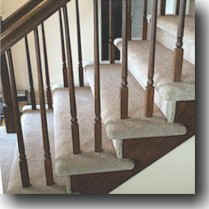 The
extra fee for installing Berber on a flight of stairs can be significant. It's
not uncommon for a fee of $25 per step. Stairs that are wrapped, double wrapped,
with spindles and a pattern match can add up to hundreds in extra charges.
The
extra fee for installing Berber on a flight of stairs can be significant. It's
not uncommon for a fee of $25 per step. Stairs that are wrapped, double wrapped,
with spindles and a pattern match can add up to hundreds in extra charges.
Seams are more difficult to do and requires extra handling and prep work. It always costs more for seaming up Berber carpets with a pattern match.
Installation cost would start at $6 per square yard for a simple job. Simple means no seaming or stairs. The cost for a more complicated install could easily be more than $10 per yard with additional fees and charges added for seaming, pattern matching, upholstery work and stairs.
Don't be surprised when the total installation cost is much higher than for other carpet styles. Learn more about Carpet Installation Cost
All Berber carpets must be installed using a power stretcher.
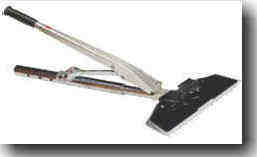 This
is absolutely imperative. A power stretcher uses long adjustable metal poles to
connect the head and the foot and uses leverage to stretch your carpet.
This
is absolutely imperative. A power stretcher uses long adjustable metal poles to
connect the head and the foot and uses leverage to stretch your carpet.
If the installer says he does not use a power stretcher, then find one who does. There is no way using a knee-kicker alone can stretch your carpet sufficiently. If your carpet is not stretched in properly it will develop wrinkles - guaranteed.
Berber Carpet Brands
You can find Berber carpet styles at your local carpet store or at the big box stores including Lowe's and Home Depot. Lowe's carries the Stainmaster Brand name exclusively. See my list of recommended carpet stores near you
Popular carpet brands like Mohawk and Shaw have lots of Berber styles available at virtually every retail flooring store.
Other popular carpet brands are Dixie Home, Dream Weaver and Karastan to name a few. See my complete list of carpet mills including their websites and contact information.
Berber Padding Requirements
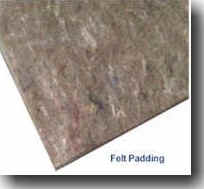 All
Berber styles require a high density pad and a lower thickness. In most cases,
the manufacturer requires a minimum of 8-pound density
and a thickness of no more than 3/8”.
All
Berber styles require a high density pad and a lower thickness. In most cases,
the manufacturer requires a minimum of 8-pound density
and a thickness of no more than 3/8”.
I prefer using a Synthetic Fiber Pad in basements because of its anti-microbial properties. Wool, Felt, Rubber or Recycled Fabric pads are often recommended for Berber styles. Check with the carpet manufacturer or read their new carpet warranty to make sure you use the correct type of padding.
Using the wrong padding can instantly void your new carpet warranty and may cause your carpet to wear out faster and develop waves, buckles and wrinkles over time.
Commercial Styles
-
Level Loop
-
Cut Pile
-
Cut and Loop
-
Patterned
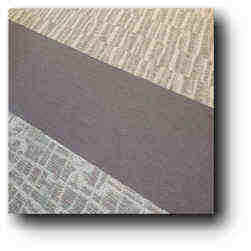 These
are the four most common styles used in offices, banks, airports and institutions today.
They are very durable because they have a very high pile density.
These
are the four most common styles used in offices, banks, airports and institutions today.
They are very durable because they have a very high pile density.
The loops, if any, are very small and packed tightly together to help prevent matting and crushing. They can be made with one solid color or from multiple colors.
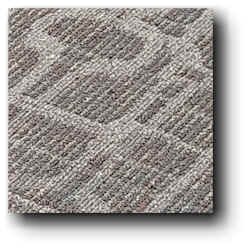 Most
homeowners don’t choose a commercial grade unless they need to use a
wheelchair or walker. The lower pile height makes it much easier for the
elderly or handicapped to walk or roll.
Most
homeowners don’t choose a commercial grade unless they need to use a
wheelchair or walker. The lower pile height makes it much easier for the
elderly or handicapped to walk or roll.
Offices and airports use commercial grade cut pile styles because they are very durable, easy to clean and tolerate heavy foot traffic when glued down to the floor without any padding underneath.
There are hundreds of various styles to consider and no way for me to show them all here. Visit your local carpet dealer and see all they have to offer.
Square Foot vs. Square Yard Pricing
Is The Same As...
9 Square Feet.
It can be confusing for consumers who hear these two different types of pricing for carpet and padding. In years past carpet was always measured and priced by the square yard.
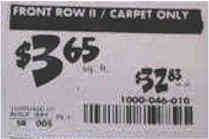 Then
in the 1980's it became popular to use the price by the square foot
method. Some said it was easier for consumers to understand. Today most
retailers show both pricing methods on their sale tags.
Then
in the 1980's it became popular to use the price by the square foot
method. Some said it was easier for consumers to understand. Today most
retailers show both pricing methods on their sale tags.
Using this price tag as an example:
Carpet priced at $3.65 per square foot...
Is equal to $32.85 per square yard.
1. A Room 12 feet wide x 18 feet long
= 216 square feet. (SF)
Calculation: 216 SF x $3.65 = $788
(carpet only cost)
2. A Room 12 feet wide x 18 feet long
= 24 square yards. (SY)
Calculation: 24 SY x $32.85 = $788
(carpet only cost)
Learn More:

